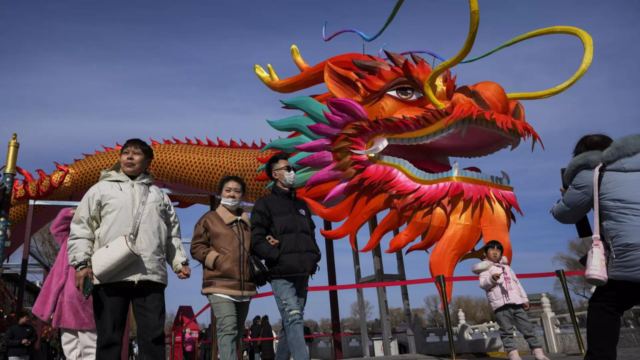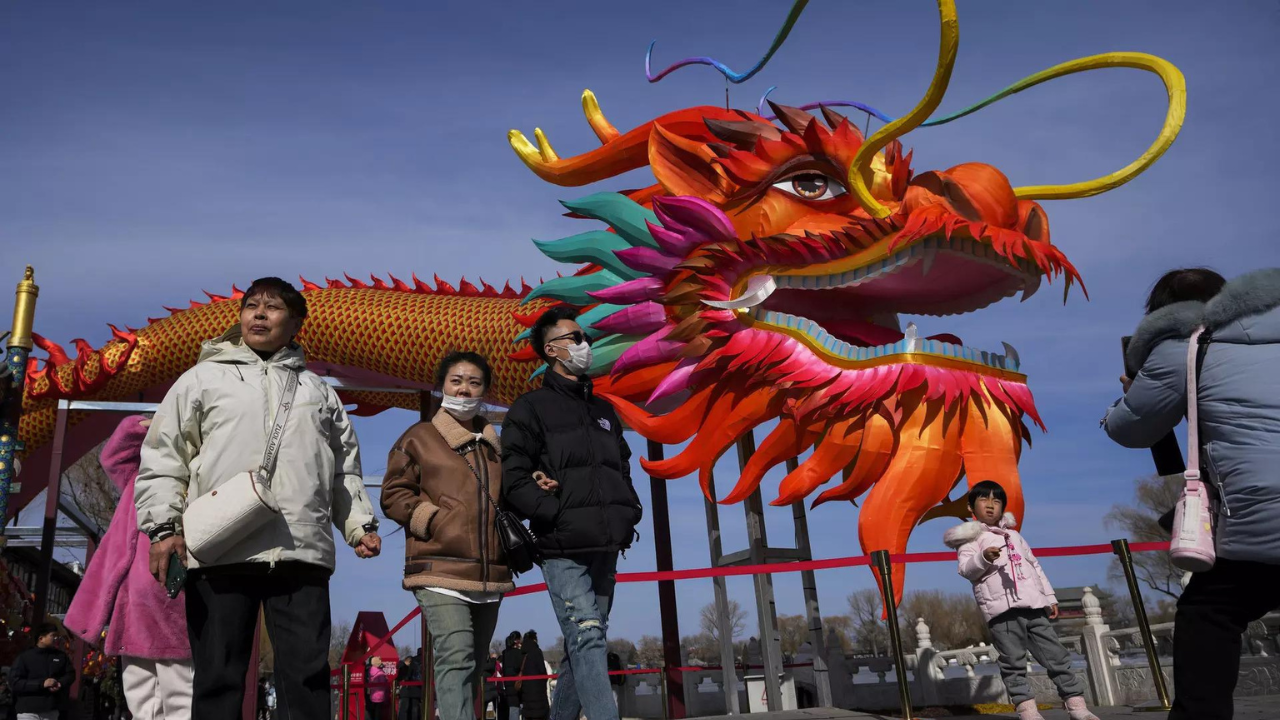This Lunar New Year, also known as Spring Festival or Chinese New Year, is an annual celebration of the first lunar cycle of the new year. It’s a weeklong national holiday in China, and this year it starts on February 10.
This is the Year of the Dragon, according to the Chinese zodiac, and it’s a symbol of “luck, wisdom and success.”
But the optimism these words inspire has been overshadowed by the current state of the Chinese economy, with many experts projecting a downturn.
In the run-up to the holiday, media reports highlighted a drop in demand for pork — a crucial ingredient in traditional dishes made around the festive times — despite falling prices.
Although a rebound in prices soon followed due to consumers’ stockpiling of pork amid harsh weather, economists believe the uptick is not sustainable.
Stock market slump a bad omen?
Meanwhile, officials have imposed a series of measures to steady the continuing slump in the country’s stock market. Many investors and traders see this as a bad omen.
In China, what happens on the state-controlled stock exchanges is always seen as a harbinger of economic growth and development. The Shanghai SSE Composite Index has slumped by almost 13% in the past year.
“If the year doesn’t get off to a good start and consumers don’t spend their money, China will remain in deflation for a long time,” Wang Guo-Chen, an economist focusing on China at Chung-Hua Institution for Economic Research, told DW.
While deflation suggests goods were cheaper, it poses a threat to the broader economy as consumers tend to postpone purchases, hoping for further reductions.
A lack of demand, in turn, can force companies to cut production, freeze hiring or lay off workers, while potentially also having to discount existing stocks — dampening profitability even as costs remain the same.
Economists consider deflation even worse than its opposite, inflation, when prices rise.
Budget travel on the rise
The Lunar New Year is usually the busiest time of year in China. Traditionally, this is a time for family gatherings, with money spent on purchasing new household items, preparations for feasts and buying gifts for relatives and friends.
“It’s the most important festival for the Chinese people,” Kong, a 31-year-old who lives in Shanghai, told DW. “And it’s certainly necessary to save a lot of money to hold a feast and buy gifts.”
Instead of having a feast at home, Kong this year decided to take a trip with her family to southern China — an option becoming increasingly popular among Chinese.
“It feels like there might be quite a lot of families traveling during the Chinese New Year,” she said, pointing to an uptick in hotel bookings. “Many family rooms were no longer available when I tried to book one a month prior to the start of the holiday.”
Last month, China’s state-affiliated tabloid Global Times reported that outbound travel bookings from Singapore, Malaysia and Thailand were up 15 times year-on-year.
Despite the impressive numbers, it’s important to note that the rise was in comparison to the figures of 2022, when it was extraordinarily difficult for Chinese to travel internationally due to the stringent infection control measures put in place as part of Beijing’s zero-Covid policy.
The government has also projected a domestic travel rush this year, with people making an estimated 9 billion trips over the 40 days surrounding the long holiday.
But Hou, a Chinese tourist who is currently on a skiing vacation near Beijing, said “prices for hotel rooms are cheaper than they were in the past few years.”
Hou, a public school teacher, said she wasn’t much affected by the economic downturn herself, but “I’ve heard from my friends that many are suffering from unemployment and salary cuts. They are buying fewer clothes and gifts for the festive season.”
Official statistics might not represent the reality
In January, China unveiled its GDP growth figure for 2023 — 5.2% — which met the country’s annual target.
According to the Chinese Bureau of Statistics, total sales of consumer goods rose by 7.2% to the equivalent of €6.3 trillion ($6.8 trillion) last year.
The food service industry alone grew by 20.4%, while retail was up 5.8%.
But some analysts have raised doubts about the figures.
“There is a discrepancy here,” Wang said, pointing to data showing rising revenues for restaurants while, at the same time, dropping prices for foodstuffs such as pork.
“This got me thinking: so, what are the Chinese exactly eating?” Wang added. “Either there’s a problem with restaurant revenues, meaning the figure didn’t grow as much, or the food prices aren’t that low.”
Wang isn’t the only one questioning of the accuracy of Chinese statistics. “Economists now largely consider Beijing’s official economic data to be only a reference point,” the Financial Times wrote in an editorial on January 17.
“If the start of the year is not successful, this will naturally have a negative impact on the whole year,” said Wang.
This is the Year of the Dragon, according to the Chinese zodiac, and it’s a symbol of “luck, wisdom and success.”
But the optimism these words inspire has been overshadowed by the current state of the Chinese economy, with many experts projecting a downturn.
In the run-up to the holiday, media reports highlighted a drop in demand for pork — a crucial ingredient in traditional dishes made around the festive times — despite falling prices.
Although a rebound in prices soon followed due to consumers’ stockpiling of pork amid harsh weather, economists believe the uptick is not sustainable.
Stock market slump a bad omen?
Meanwhile, officials have imposed a series of measures to steady the continuing slump in the country’s stock market. Many investors and traders see this as a bad omen.
In China, what happens on the state-controlled stock exchanges is always seen as a harbinger of economic growth and development. The Shanghai SSE Composite Index has slumped by almost 13% in the past year.
“If the year doesn’t get off to a good start and consumers don’t spend their money, China will remain in deflation for a long time,” Wang Guo-Chen, an economist focusing on China at Chung-Hua Institution for Economic Research, told DW.
While deflation suggests goods were cheaper, it poses a threat to the broader economy as consumers tend to postpone purchases, hoping for further reductions.
A lack of demand, in turn, can force companies to cut production, freeze hiring or lay off workers, while potentially also having to discount existing stocks — dampening profitability even as costs remain the same.
Economists consider deflation even worse than its opposite, inflation, when prices rise.
Budget travel on the rise
The Lunar New Year is usually the busiest time of year in China. Traditionally, this is a time for family gatherings, with money spent on purchasing new household items, preparations for feasts and buying gifts for relatives and friends.
“It’s the most important festival for the Chinese people,” Kong, a 31-year-old who lives in Shanghai, told DW. “And it’s certainly necessary to save a lot of money to hold a feast and buy gifts.”
Instead of having a feast at home, Kong this year decided to take a trip with her family to southern China — an option becoming increasingly popular among Chinese.
“It feels like there might be quite a lot of families traveling during the Chinese New Year,” she said, pointing to an uptick in hotel bookings. “Many family rooms were no longer available when I tried to book one a month prior to the start of the holiday.”
Last month, China’s state-affiliated tabloid Global Times reported that outbound travel bookings from Singapore, Malaysia and Thailand were up 15 times year-on-year.
Despite the impressive numbers, it’s important to note that the rise was in comparison to the figures of 2022, when it was extraordinarily difficult for Chinese to travel internationally due to the stringent infection control measures put in place as part of Beijing’s zero-Covid policy.
The government has also projected a domestic travel rush this year, with people making an estimated 9 billion trips over the 40 days surrounding the long holiday.
But Hou, a Chinese tourist who is currently on a skiing vacation near Beijing, said “prices for hotel rooms are cheaper than they were in the past few years.”
Hou, a public school teacher, said she wasn’t much affected by the economic downturn herself, but “I’ve heard from my friends that many are suffering from unemployment and salary cuts. They are buying fewer clothes and gifts for the festive season.”
Official statistics might not represent the reality
In January, China unveiled its GDP growth figure for 2023 — 5.2% — which met the country’s annual target.
According to the Chinese Bureau of Statistics, total sales of consumer goods rose by 7.2% to the equivalent of €6.3 trillion ($6.8 trillion) last year.
The food service industry alone grew by 20.4%, while retail was up 5.8%.
But some analysts have raised doubts about the figures.
“There is a discrepancy here,” Wang said, pointing to data showing rising revenues for restaurants while, at the same time, dropping prices for foodstuffs such as pork.
“This got me thinking: so, what are the Chinese exactly eating?” Wang added. “Either there’s a problem with restaurant revenues, meaning the figure didn’t grow as much, or the food prices aren’t that low.”
Wang isn’t the only one questioning of the accuracy of Chinese statistics. “Economists now largely consider Beijing’s official economic data to be only a reference point,” the Financial Times wrote in an editorial on January 17.
“If the start of the year is not successful, this will naturally have a negative impact on the whole year,” said Wang.




































